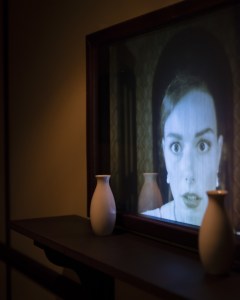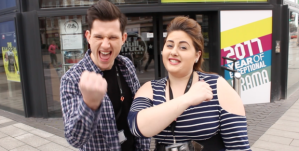Review: One Day, Maybe (Kasang Corporation, Hull city centre)
Dreamthinkspeak’s immersive, site-specific experience looks at South Korea’s suppressed popular uprising

© Thomas Arran
Next to its nuke-toting neighbour, we tend to think of South Korea as a bastion of freedom. Dreamthinkspeak’s latest site-specific piece, created for the Hull City of Culture with several Asian producing partners, questions that twice over, delving back to a suppressed popular uprising and looking ahead to an era of consumerist conformity. Join the two – disappeared protesters and our digital world – and One Day, Maybe demonstrates the frailty of democratic freedoms; hard won, easily lost.
For nine days in May 1980, the people of Gwangju City, 250 miles south of Seoul, protested against the newly unelected, military government. Under the order of generals Chun Doo-hwan and Roh Tae-woo, the uprising was quickly quashed. Hundreds died; many more disappeared.
One Day, Maybe gives us a flavour of contemporary South Korea, but it lets that history linger in the air. In the cheapo, corporate HQ – all lime green and logos – of the Kasang Corporation, we’re handed a personal tablet to test its new tech. There’s a ‘statue’ of the Gwangju protestors. "Without these people," its CEO purrs, "there would be no Kia, no Samsung, no LG, no Kasang…" The list goes on. The question hangs heavy. Did they fight for this?
It’s a show that swings from disappearance to digitisation and back. One moment, we’re in a contemporary shopping mall – a corridor of colourful boutiques – swiping shopping into online baskets as assistants chatter at us in Korean. The more we spend, the more points we accumulate. Then next, we’ve tripped into a derelict police station – loose ceiling tiles and long Kafkaesque corridors. Chairs sit next to buckets in dark rooms. Mugshots of young faces line the walls. It’s up to us to put the pieces together.
Dreamthinkspeak deals in absences. Tristan Sharps’ site-specific shows sit somewhere between immersive experiences and installations. They specialise in signs of life – traces of people and echoes of events. It’s eerie and uneasy; the hairs on your neck stand on end. You feel like you're trespassing on something, like the past might come to life. When it does, your heart races.
It is, however, a disjointed experience that glitches from one section to the next, as it moves from murder mystery to sculpture, game to dance-theatre. Those shifts break the show's spell. There’s a fair bit of hanging around and, spread over two hours, it risks feeling thinner than it really is. The space doesn’t help. An empty office block, it lacks the specificity to enthral or transport.
A shame, because the thinking is super – like a multimedia essay of a theatre experience. Sharps brilliantly juxtaposes two types of absence – disappearance and digitisation – to chart the way democracy has hollowed out; freedom to consumer choice; democratic responsibility to corporate toy world. We watch audience members fumble with empty space in VR booths, then enjoy a tender and tactile traditional jesa ceremony. A model of miniature identikit flats, tiny occupants climbing the walls, contrasts with a space filled with traditional cooking implements. What, this demands, have we lost? What’s disappeared?
One Day, Maybe runs in central Hull as part of Hull City of Culture until 1 October.















